Tobias and the Angel
Gabriella Polony Mountain's work includes four major themes. The first three themes are clearly recognizable as the Cosmos, Nature, and Figural works with the fourth theme encompassing history, philosophy, and culture. In her life as an artist, Polony Mountain worked with many different medium including mosaics, weavings, sculpture, stained glass, and repousse. Stained glass refers to the material of colored glass as well as to the works that are created from it. Historically, stained glass was used to adorn the windows of churches and other religious buildings. The process of stained glass includes two methods. One method achieves color by adding a metallic oxide to the glass while it is in a molten state, it is then rolled into a sheet and left to cool. The other method is to paint directly onto the glass to achieve color and then fusing the paint to the glass by use of a kiln. The first step to creating a stained glass window is to create a design or image narrative in a cartoon drawing. The pieces of colored glass are then used to create the stained glass design.
The stained glass window depicts Gabriella Polony Mountain's variation on a theme of the Old Testament's Tobias and the Angel from the Book of Tobit (393 AD). The Archangel Raphael is depicted in grand form with wings spread, he towers above the human form of Tobias. Polony-Mountain uses the lead lines to create differentiation of form and shape with the selection of color seeming almost secondary to her use of line.
Included below is the story of Tobias and the Angel from the website http://www.tobiasinnola.com/the-story.html:
"In Nineveh, Tobit, a good man, defies the law and buries the body of one of his fellow Jews, who has been killed on the orders of the king. His wife, Anna, is afraid, but his son, Tobias, helps him.
Polluted by the burial, Tobit and Tobias sleep outside. Tobias gets distracted and joins the villagers in a dance. There, he meets a stranger who is dancing in a peculiar way and who tells Tobias to “listen to the silence in the song”. Tobias ignores him and carries on dancing.
In the morning, when Tobit wakes up alone, a flock of birds defecate in his eyes and he becomes blind.
On the same morning, in far away Ecbatana, a young woman named Sara wakes to find that her newly married husband is dead, murdered by en evil spirit, Ashmodeus, who is in love with her. This is the seventh time this has happened. Sarah’s father, Raguel, orders his servants to bury the body secretly.
Tobit and Sarah both pray for help.
Unable to work, Tobit sends Tobias to Ecbatana to reclaim a debt from his cousin Raguel. The Stranger offers to guide him.
On the journey, The Stranger encourages Tobias to listen to the songs sung by the trees, the mountains and a river. Tobias can’t hear them. He falls into the river and is almost eaten by a giant fish, but he manages to kill it. The Stranger tells him to cut out its heart and gall.
They arrive in Ecbatana. Raguel, who is unwilling to pay the debt, hatches a plot to have Tobias marry Sara, hoping the demon will kill him, too. When Tobias sees Sara, he at once hears the song of her beauty. He falls in love and they are married.
On their wedding night, Tobias is initially unable to hear the song of the demon, but just in time, The Stranger advises him to throw the heart of the fish onto the fire in the bedroom. The demon is exorcised and Sara is free at last. In the morning, Raguel is angry that Tobias has survived the night and is reluctant to pay the money, but Sara persuades him.
The Stranger, Sara and Tobias journey back and hear all the songs of the trees, the mountains and the river.
Back in Nineveh, The Stranger tells Tobias to apply the fish gall to his father’s eyes. Tobit’s sight is restored. They offer to pay The Stranger all of the money in return for his help, but he reveals himself to be the angel Raphael, who has descended to Earth to answer Tobit and Sara’s prayers. Raphael then returns to heaven."

